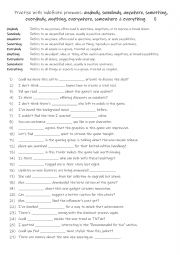
|
A2-B1 Practise with indefinite pronouns anybody, somebody, anywhere, something, everybody, anything, everywhere, somewhere & everything 5
First, students need to familiarise themselves with the 9 indefinite pronouns and their meanings and use. Then they read the sentences to work out which one is needed to complete the gap-fill. Each word is used 3 times! Answers on page 2
Level: elementary
Age: 8-100
Type:
Downloads: 103
|
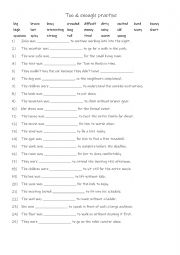
|
A2-B1 Too & enough practise
Understanding the correct use of "too" and "enough" enhances students ability to form more complex sentences and express nuances in meaning, which are key to advancing their English fluency. Students read the sentences and complete it with an adjective + too / enough. Answers on page 2.
Level: elementary
Age: 10-100
Type:
Downloads: 122
|
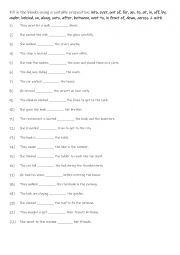
|
A2-B1 22 different prepositions
Students read the sentences to find what type of preposition is required to complete the gap-fill. Each preposition is only used one time. Answers on page 2.
Level: intermediate
Age: 10-100
Type:
Downloads: 105
|
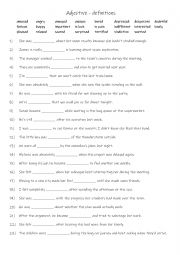
|
B1 23 adjectives to describe feelings - gap-fill exercise
Students familiarise themselves with the 23 adjectives in bold font. Then they read the sentences to see how that person felt in that situation - and complete the gap-fill with a suitable given adjective. Answers on page 2.
Level: intermediate
Age: 8-100
Type:
Downloads: 100
|
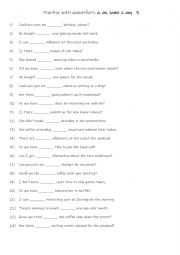
|
A1-A2 Practise with quantifiers a , an , some & any 5
Mastering these basics is essential for both everyday communication and more advanced language use, as these quantifiers are frequently used in real-life scenarios like offering, requesting, or describing items. First, students need to familiarise themselves with 4 quantifiers and check their meaning and use. Then they read the sentences to see whi...
Level: elementary
Age: 7-100
Type:
Downloads: 110
|
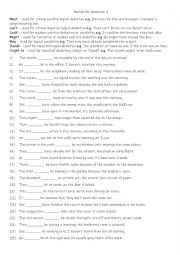
|
A2-B1 7 modals for deduction 2
First, students need to familiarise themselves with the modals and their use. Then they read the sentences to see which one is needed to complete the gap-fill. Each modal is used 4 times! Answers on page 2.
Level: elementary
Age: 9-100
Type:
Downloads: 113
|
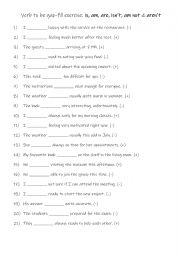
|
A2 Verb to be gap-fill exercise is, am, are, isnÔŅĹt, am not & arenÔŅĹt 1
Students read the sentences to see which form of the verb to be is needed to complete the sentences. (+) needs a positive form and (-) needs a negative form of verb to be. Answers on page 2
Level: elementary
Age: 7-100
Type:
Downloads: 103
|
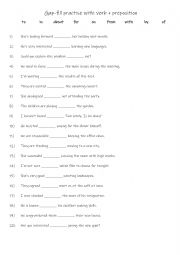
|
Gap-fill practise with verb + 9 prepositions
The gap-fill exercise provided is suitable for A2+-B1 level students. It involves common prepositions and phrases that are often used in everyday contexts, making it appropriate for learners who have a solid grasp of basic grammar and are ready to tackle more nuanced uses of prepositions. Answers on page 2.
Level: elementary
Age: 10-100
Type:
Downloads: 124
|
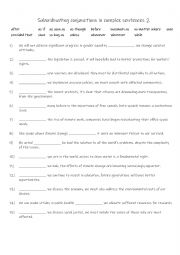
|
B1+-B2 Subordinating conjunctions in complex sentences Part 2
Using subordinating conjunctions allows students to express more detailed and nuanced thoughts. For instance, "although" and "even if" help convey contrast or condition in sophisticated ways. They add variety to writing and speaking, moving beyond simple sentences and making communication more engaging and dynamic. For example, "whenever" or "whoev...
Level: intermediate
Age: 10-100
Type:
Downloads: 129
|
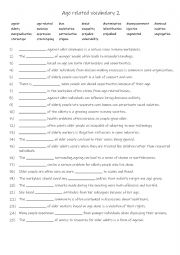
|
B1+-C1 Age related vocabulary 2
First, students need to familiarise themselves with the 25 words and their meanings Then they read the definitions to see which one is being described and write that word in the space provided. Answers on page 2.
Level: intermediate
Age: 11-100
Type:
Downloads: 136
|












